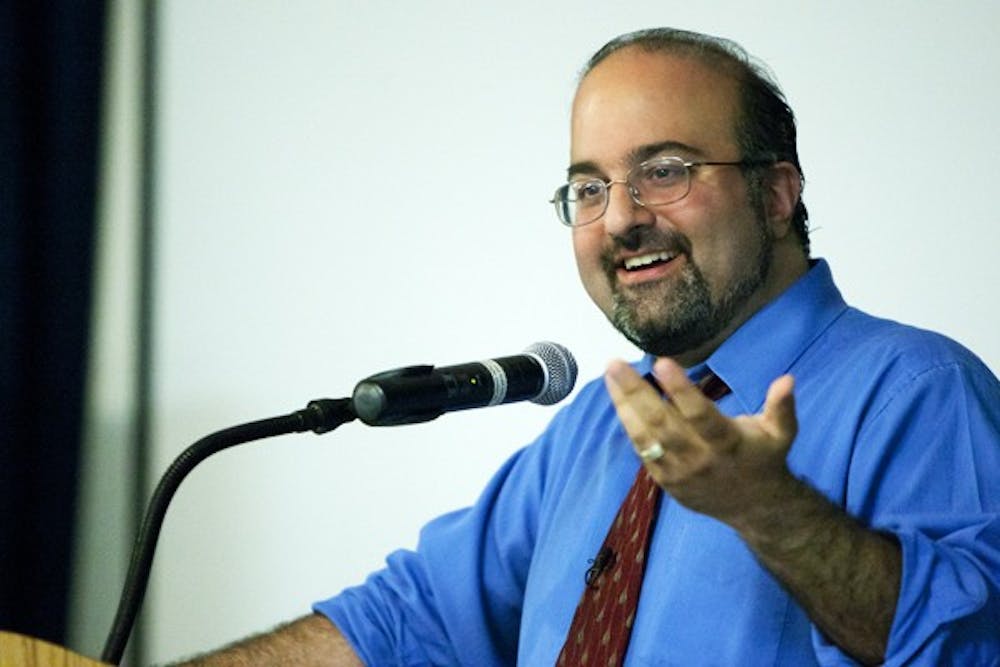Muslim public intellectual Omid Safi talks Islamic tradition, issues

Public intellectual and professor at the University of North Carolina Omid Safi said you can always buy clothes, books and music, but you can’t buy more time.
“The number of breaths we take in life is measured. So, thank you for coming out and taking your time to attend this talk," Safi said to those in attendance for his speech on Wednesday in the Bovee University Center's Auditorium.
Muslim beliefs and issues were brought to the forefront by Safi at his Tuesday and Wednesday evening speeches.
The Central Michigan Univiersity religion department invited Safi to speak on campus, where he focused directly on two main concepts of love, by providing background information, personal stories and direct examples.
On Tuesday, Safi spoke on behalf of the poetry of Rumi, a mystical figure of the Islamic tradition. Safi described Rumi’s viewpoints and poetry during his presentation "Love: Human and Divine."
Philosophy and religion professor Talat Halman introduced Safi by honoring him with a detailed eulogy. Halman listed all of Safi’s accomplishments, including awards and titles he has been named as teacher, speaker and leader.
Safi covered the Islamic tradition of bringing divine love and human love together, specifically taking into consideration poet Rumi’s 800 pages of stories. Safi began Tuesday night’s talk by explaining the viewpoint of time being of the essence.
After thanking the students and faculty who attended the talk, he then tied in Rumi’s teachings of time and how people should put their hearts where their feet are.
“Rumi and his tradition tells us that we cause ourselves pain because we project ourselves far into the future and for some people, the past,” Safi said. “Rumi has the most simple, direct, vivid and powerful language. Have your heart be where your feet are; if your feet are here, then be present.”
According to Safi, time isn’t the only concept Rumi taught. The poet had a rather larger focus on love. More specifically, two types of love connecting — the human love and the divine love.
“Rumi believes there are two kinds of love, you have to be able to learn how to love people, which ultimately ties in with loving god. The divine love and human love resemble each other; it is an ever-circling motion of love,” Safi said. “The people we love the most are the only ones that get on your nerves the most. We let love transcend the hatred, let the light shine over the darkness.”
Rumi’s practices had just been taught in Halman’s classes.
Riverdale grad student Sarah Avery was one of many students who had been looking forward to Safi's visit and voluntarily attended his talk.
“I’m currently enrolled in Professor Halman’s REL 305: Mysticism class, we just finished studying Rumi’s teachings. Rumi is all about embracing God in everything you do,” Avery said. “Rumi’s poetry is very moving and musical. It is something you feel and it paints pictures.”
Due to the impact Rumi had on students, Halman brought in Safi to elaborate on the heritage.
“Rumi has had a great influence on my students,” Halman said. “I brought in Safi, because I knew that people would leave inspired and enthused.”
Following Tuesday’s speech, Safi returned Wednesday and covered the topic of America and Islam. rising beyond the politics of fear post-Sept. 11.
“I have never seen us so divided and so nasty toward one another,” Safi said. “We target one another out of fear, out of ignorance when we have significantly higher potential as human beings.”
Safi described the different happenings throughout politics, when racial views have come into play involving Muslims. For instance, during President Barrack Obama’s 2008 campaign, there was an issue when citizens found out his middle name, Hussein. Safi elaborated on how people’s views changed toward Obama, because people considered him to be “Muslim.” Safi provided different Islam phobia examples, personal and political, that especially stood out to Clinton Township junior Amanda Jaczkowski.
“I have been studying Islam phobia in society and found Omid Safi to be very interesting. It was good to hear someone present facts that wasn’t manipulated from the media,” Jaczkowski said.



